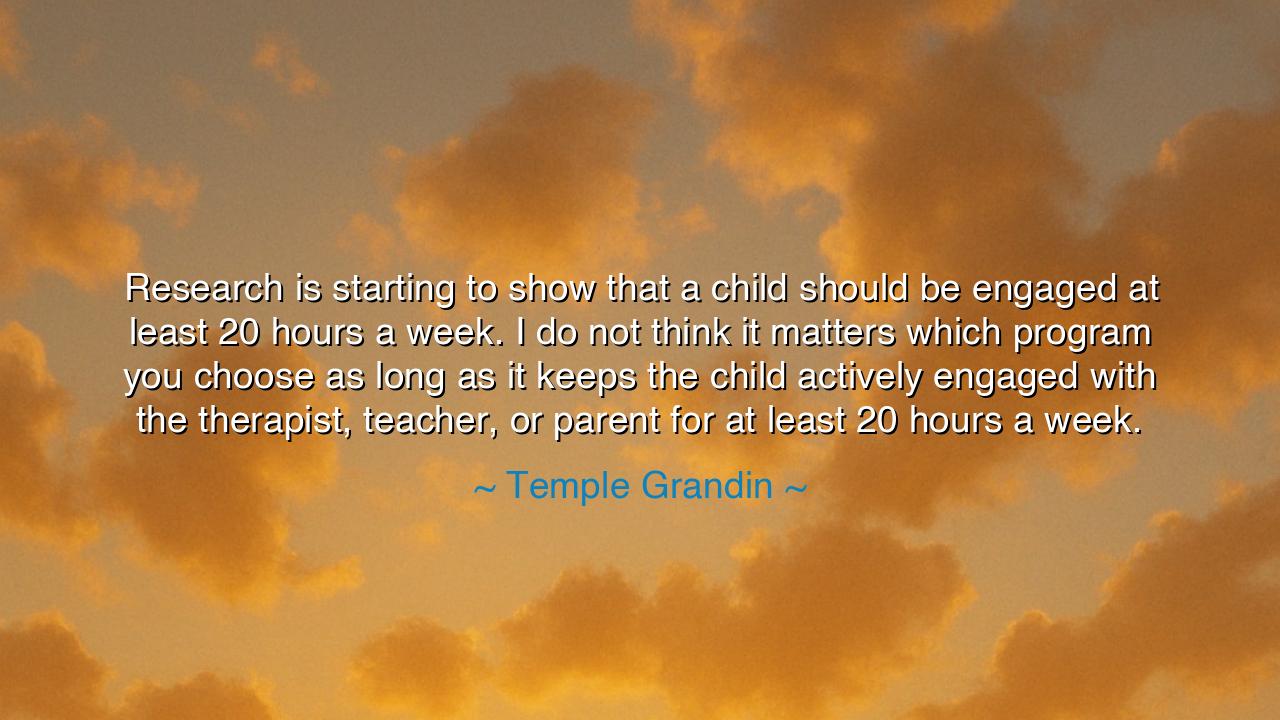
Research is starting to show that a child should be engaged at
Research is starting to show that a child should be engaged at least 20 hours a week. I do not think it matters which program you choose as long as it keeps the child actively engaged with the therapist, teacher, or parent for at least 20 hours a week.






Hear the voice of Temple Grandin, a woman who has walked through the fire of her own struggles and emerged with wisdom not only for herself, but for the world: “Research is starting to show that a child should be engaged at least 20 hours a week. I do not think it matters which program you choose as long as it keeps the child actively engaged with the therapist, teacher, or parent for at least 20 hours a week.” In this utterance lies not only the counsel of science but the testimony of experience. For Grandin herself, living with autism, knew the power of sustained attention, of repetition, of deliberate effort guided by love and patience.
The origin of these words is her lifelong work as both scholar and advocate for those whose minds are shaped differently. In an age when children with autism were often dismissed, hidden, or abandoned, she rose to declare that what they needed was not pity but engagement — consistent, structured, intentional interaction with those who believed in them. The twenty hours she names are not a number born of theory alone, but the reflection of hard-won research, showing that learning and growth do not come by chance or in scattered moments, but by steady and faithful practice.
The meaning of her words is both simple and profound. She does not demand one particular program, nor does she exalt one method above another. Instead, she places the emphasis on engagement itself — the living bond between child and guide. It may be a therapist teaching through play, a teacher shaping the rhythms of the classroom, or a parent patiently working at home. What matters is not the name of the method, but the constancy of presence, the hours of connection that draw the child out of isolation and into relationship with the world.
Consider the story of Thomas Edison, who as a child was labeled slow and unteachable by his schoolmasters. His mother, refusing to accept this judgment, removed him from school and taught him herself, keeping him constantly engaged in experiments, readings, and conversation. Her devotion, her persistence, her belief in her child became the soil from which one of the greatest inventors in history emerged. This mirrors Grandin’s teaching: that growth springs not from brilliance of method alone, but from the time, presence, and engagement given with consistency.
The heart of her wisdom is also deeply emotional: that children thrive not in neglect or isolation, but in the warmth of attention. To engage a child for twenty hours a week is not merely to train skills, but to affirm their worth, to say again and again, “You are seen, you are worth the time, your growth matters.” The number of hours is not a prison but a promise — that persistence brings change, that steady labor bears fruit. The child who receives such attention begins to know not only knowledge, but love.
The lesson for us is unmistakable: growth demands commitment. Whether in raising a child, mastering a skill, or shaping one’s own character, small scattered efforts are not enough. It is daily, deliberate, repeated practice that transforms weakness into strength, confusion into clarity. In the words of Grandin, we are reminded that no magic system or single moment is the key; it is engagement itself, given with patience, that changes lives.
Therefore, take these practical actions: If you are a parent, teacher, or guide, commit yourself not to occasional bursts of effort but to steady, intentional presence. Do not be distracted by endless debates over which program is best, but focus instead on giving time, attention, and structured care. If you are the learner, hold to daily discipline, for greatness is built not in an hour but in many hours faithfully endured. And in all things, remember that engagement is love made visible through time.
So remember Temple Grandin’s words: “A child should be engaged at least 20 hours a week.” Behind the science lies an ancient truth — that growth requires time, and love requires labor. Give the hours. Give the presence. Give the steady engagement that transforms not only the child but the teacher as well. For in such constancy is revealed the true force of human care, the power to awaken potential where others saw only limitation.






AAdministratorAdministrator
Welcome, honored guests. Please leave a comment, we will respond soon